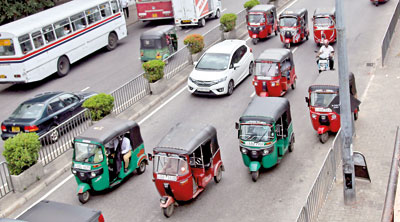News
Three wheelers to be regularised under a new Commission
A regulatory mechanism will be established for three-wheelers once Parliament passes an Act to transform the National Council for Road Safety (NCRS) into a Commission, a top official said.

Outnumbered: Three-wheelers currently have no regulatory authority
NCRS Chairman Dr Sisira Kodagoda told the Sunday Times that the new commission will coordinate with Provincial Councils (PCs) to streamline the regulation of all transport services, including buses, trains, three-wheelers and school vans. “The commission will formulate national policies in consultation with the PCs. The Transport Ministry Secretaries of all nine PCs will be involved in this process. The PCs will enforce the policies at grassroots level,” he explained.
The Attorney General’s Department has already given the green light to the new Act and a Cabinet Paper on the subject is expected to be introduced soon. Once approved by Cabinet, the draft legislation will be presented to Parliament for approval. Dr Kodagoda said he believes the process will be completed before the upcoming government budget.
The NCRS is also currently conducting an island-wide survey of three-wheelers, school vans and private buses focusing on issues faced by the drivers, and owners of these vehicles and the passengers. The survey is to conclude in December and will aid the proposed commission to formulate policies aimed at standardising transportation services, Dr Kodagoda stressed.
Three-wheelers currently have no regulatory authority, and the NCRS chairman noted that they will be subject to regulation once the new commission is established.
Accordingly, the commission would be able to control three-wheeler fares, ensure that all three-wheelers that are used as taxis are fitted with meters and other regulatory measures.
Meanwhile, Cabinet this week revoked the gazette notification issued by the Transport Ministry that imposed an age limit of 35 years for eligibility to obtain a three-wheeler driving licence. The decision was taken after a majority of the Cabinet of Ministers, including President Maithripala Sirisena, opposed the age barrier.
Even without the age barrier, there was still a pressing need to establish a regulatory mechanism for three-wheelers, insisted Deputy Transport Minister Ashok Abeysinghe. He pointed out that, currently, three-wheeler drivers can arbitrarily hike up their fares and are not governed by any authority. “If you look at India, there are strict regulations for passenger transporting three-wheelers. There is no reason why such regulations should not be implemented here.”
Meanwhile, three-wheeler trade unions have expressed differing views on the plans to regulate them.
Sudhil Jayaruk, President of the All-Island Three Wheeler Drivers’ and Owners’ Association (AITWDOA) stated that his union was supportive of the move and had made representations to the Finance Ministry regarding it. The union vehemently opposed the 35 year age limit that the Transport Ministry tried to impose, though it was supportive of a much lower age limit. “We acknowledge that young people are turning towards driving three-wheelers rather than enrolling in technical education courses that would help them enter other professions. As such, we proposed that a person should be over 25 years of age to be eligible to obtain a three-wheeler driving licence,” he said. Mr Jayaruk remarked that their proposal was that even then, a driving licence should only be awarded after a two-year training programme where the drivers would be educated on civil law, criminal law, road rules and psychology that would equip them with knowledge and experience to be not merely law abiding drivers, but considerate human beings too.
However the AITWDOA observed that the 35-year age barrier mades no sense since it is an age by which most individuals would have already been engaged in a profession for some years. The association felt it would be unrealistic to expect that such a person would suddenly give that up and move to drive three-wheelers.
A regulatory authority would be able to introduce a special licence plate, a designated colour and meters for three-wheelers that are on hire as well as a pricing formula at provincial level. It will also break the increasing competition that private taxi companies are starting to exert on the three-wheeler passenger market, Mr Jayaruk opined. “Such things cannot be done through a gazette. It needs an Act of Parliament. We support the mechanism on these grounds.”
Lalith Dharmasekara, President of the All-Island Three Wheeler Drivers’ Union, however, argued that establishing a regulatory authority was “pointless” when the government had so far failed to implement even the most basic regulations that it had gazetted earlier. “I have been talking about regulations for the past 19 years, but successive governments have done virtually nothing,” he lamented.
Mr Dharmasekara noted that, though an individual is eligible to apply for a heavy vehicle licence at 21 years, he must be 23 or over to be eligible to drive a passenger bus. “These regulations were gazetted in February, 2014. They could have easily applied them to three-wheelers then by imposing an age limit between 23 and 65 or 23 and 70. But this was not done.”
Even the gazette issued in January 2017, which imposed a host of new regulations on three-wheelers, including making taxi meters mandatory, was not implemented.
Though the NCRS announced in April and again in August this year, that meters will be made mandatory for three-wheelers, there has been no enforcement of the regulation so far, he further pointed out.

